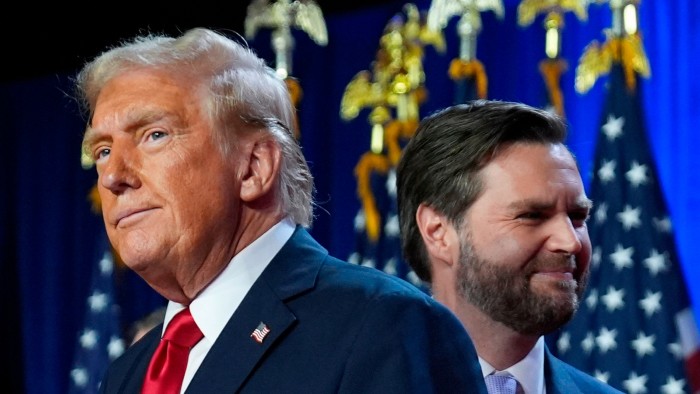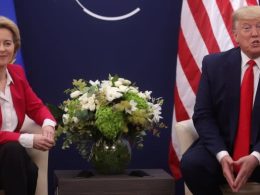Unlock the White House Watch newsletter for free
Your guide to what the 2024 US election means for Washington and the world
The writer is director of economic policy studies at the American Enterprise Institute
Donald Trump’s stunning return to power cements his status as a figure of historic consequence. His influence began in 2015 with that now-iconic ride down Trump Tower’s golden escalator and vice president-elect JD Vance, among others, will work to ensure that it extends well into the next decade. We live in The Age of Trump.
Even as a second-term president, he will wield enormous power, particularly if his party controls the House and Senate, as seems likely to be the case for the next two years. But Trump is nonetheless a lame duck, term-limited by the US Constitution. The battle for the future of the political right began on Wednesday morning.
The first front in that fight will be several pressing policy decisions that will expose the biggest rift in the Republican Party and those that surround Trump: the divide between populists and traditional “supply side” conservatives.
First, tax. Next year, Republicans will be responsible for reforming the tax code when provisions of Trump’s 2017 tax law expire. Populism is sceptical of big corporations, and Vance — more of a Trumpian populist than Trump himself — argued as recently as May against further reductions in the corporate tax rate. Vance has staked out other positions against big business, as well.
But Trump is siding with traditional pro-business conservatives, championing further reductions in the corporate rate, on top of those he enacted in 2017.
Similarly, several prominent populist Republicans have supported Lina Kahn, the Biden administration’s controversial antitrust enforcer, for going after Big Tech and more aggressively enforcing competition policy. But in another victory for pro-business conservatives, Trump is expected to replace Kahn. His re-election has unleashed a wave of optimism that the next four years will see more mergers and acquisitions.
Populism seems certain to lose some big fights because Trump will back traditional GOP policies. It also seems likely that his supply side policies have a better chance of enduring than his populist ones. Over the longer term, political success must rest on a foundation of policy success — and the evidence suggests that populist policies such as tariffs do not improve economic outcomes for workers and households.
One of the lasting victories of the Trump era may be to reinforce the importance of low business taxes for typical workers and households, rather than the populist lesson that big corporations are problematic and should be treated with suspicion. Trump’s 2017 corporate cuts increased business investment, workers’ incomes, and the domestic operations of multinationals.
Then there is trade. Here Trump sits firmly in the populist camp, promising a large escalation of the tariff regime he put in place during his first term. This would hurt — not help — the working class. It is clear that his 2018-19 trade war reduced manufacturing employment, made domestic manufacturing less competitive and failed to meaningfully weaken economic ties between the US and China.
To be sure, Trump is set to continue on this worrying path. But protectionism has not won the intellectual argument, and the business community — a powerful force in the GOP coalition that will now reassert itself — favours free trade. With the exception of China, the political right may ultimately return to its pro-trade roots.
If there is one issue on which Trump’s populism does seem set to endure, it will be immigration. His public posture has been pure populist, demonising immigrants and promising the largest deportation effort in US history. Here, he appears to have won the argument: the American people want a secure southern border and will not tolerate large inflows of undocumented immigrants.
But, if you look closely enough, Trump is already quietly sending mixed signals on legal immigration, indicating that he might support increases. I am sceptical. We’ll know soon enough.
These battles for the right’s future will split the Republicans over the next few years. But there are other key elements of Trump’s populist message that seem doomed. His desire to side with “the people” has led him to oppose reductions to projected Medicare and Social Security spending. However the nation’s fiscal imbalance is unsustainable. Future Republican officials will have no choice but to address it.
The global stage is another example. Whenever America retreats from the world, the escalating geopolitical instability that inevitably follows calls us back. We too benefit from the peace and prosperity brought about by the post-second world war international order.
More importantly for the future of Trumpism, the share of the electorate receptive to his dark message of “American carnage” should shrink in the years to come. This was particularly powerful in the years following the 2008 financial crisis. As this week’s results show, it has retained much of its strength as workers and households were rocked first by the Covid-19 pandemic, and then by rapid inflation and high prices. But these experiences are aberrations, not the norm.
Trump has always been a uniquely gifted messenger. But in part because of this, Trumpism is unlikely to outlast him. The fight for what comes next has already arrived.
Source link









